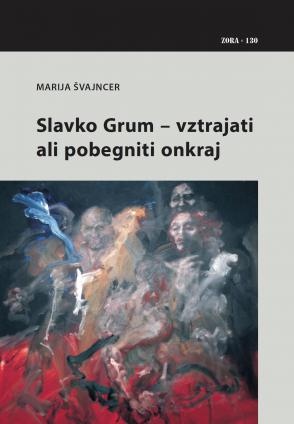Slavko Grum – vztrajati ali pobegniti onkraj
Keywords:
philosophy of sadness, escape beyond, subjectivism, ndividualism, alienation, contemporary writerSynopsis
The scientific book Slavko Grum – to persist or to escape beyond, deals with the art works and personal letters of a Slovenian playwrigther and writer Slavko Grum and their intimate and general human content. The author was in Slovenia well represented in many writings, amongst which the profound presentation was made by Lado Kralj. Even though the two acts play Dogodek v mestu Gogi (An Evant in the Town of Goga) is being performed till this day, renewed and new pondering about it can be justified. Depth, subtlety, relevance and a message about disunity and alienation of the world are to be found in Grum’s weitings. A similiar feeling that is portrayed by Slavko Grum can be attributed also to our time. The original and stylistically selected depiction of it all witnesses the greatness of the artist.
The escape beyond har several meanings. It could be interpreted as a withdrawal towards death – where the frightened, wounded, stigmatized and abused people vanish. Grum’s protagonists fear death and are trying to escape it, while on the other hand, they are maintaining a friendly, almost loving relationship with it. Death represents an ally to them, the comforter and sweet pain that could set them free of all the bad any moment. Persistence equals resorting to artistic creation, dreams, desire, fantasy images and stupefaction, although it represents the escape beyond sometimes itself, however, art in the fatal moments of desperation and resignation is certainly what assists one to be able to live. Occasional fusion of what is here and what is supposed to be beyond is tied with distress and effort that after all it might be possible to find something that would keep a man alive or at least allow him to live.
Grum paints contrasts, contradictions, paradoxes and grotesque events with aesthetic effectiveness and artistic persuasion. Although his writing appears to be painful, the irony and sarcasm are present as well. His love letters, re-vealed to the public, are on the one hand sincere and emotional confessions, meant fort he cover, and on the other hand the artistic creation, where a girl is solely an ispiration and a dream object, as Grum, in fact, does not desire true unity and mutual life, as he is constantly undermining and demolish-ing their relationship. He pushes the girl away and remains true to himself, while being unhappy, lonely and sad. Emotional relationships are usually not equiivalent; they are unequal and marked hierarchically. The elderly dominate the younger, children are abused, girls are pushed to the streets by the social deprivilege to sell their bodies. Grum displays human endangerment in soci-ety and express the literary controlled compassion and the desire to achieve a better life. Subjectivism and individualism are obvious components of his work. The antihero is conscious, but also a factor pushed to the social edge, experiencing and feeling the environment as an individual, who is unable to find a path to others. Alienation is an occurence of life. People are one anto-her’s reproach and consciousness, they are condemned to live together, having only time and space in common and being unable to form genuine human bonds. Internal negation and integration of extremes express the power of Grum’s literary design. His literary creations are subtle, stylistically purified and elevated, reflecting the European literature of the time. Grum in writer od existential and border situations, his work, especially the drama Dogodek v mestu Gogi (An Event in the Town of Goga), will certainly not fade in time. Writing about people who are stuck in the past and who cannot accept the present, melancholics, depressed and mentally divided persons remains current, Slovene-sore, and here.
Downloads






